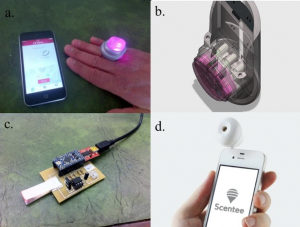Collaborators: Olivia Petit, Adrian David Cheok, Charles Spence, Carlos Velasco, Kasun Thejitha Karunanayaka.
Abstract
This workshop aims to increase awareness of the different ways in which new technologies (e.g. social media, virtual reality, digital, and neuroimaging technologies) can be used as input or means to develop multisensory experiences that improve consumer satisfaction. Consumers experience products and services via their senses (i.e. sight, hearing, smell, taste, touch). The specific multisensory content of those products and services can influence people’s respective attitudes, purchase intentions, and consumption. Today, consumers experiment the world through new technologies, for example, by sharing their feelings via social media, or by creating avatar in a virtual world. The challenge for marketing consists of monitoring new technologies to better understand consumer sensory experiences and to develop innovative actions that will help to improve these experiences. We will begin with the definition of sensory marketing and the role of multisensory processes in consumer experience. Second, we will address the possibility of better understanding the consumer through social media and neuroimaging technologies. To finish, we will present some technologies that are already enriching sensory experiences of consumers.
Keywords: Sensory Marketing, Digital Marketing, Multisensory, Consumer Neuroscience, Digital Technologies.
Figure 1. a. Ring*U; b. Kissenger; c. Digital Taste interface; d. Scentee

